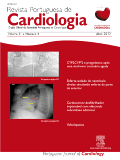
Revista Portuguesa de Cardiologia
metrics 2024
Fostering collaboration and knowledge in the heart of cardiology.
Introduction
Revista Portuguesa de Cardiologia, published by Elsevier España SLU, stands as a pivotal resource in the realm of Cardiology and Cardiovascular Medicine. With its origins tracing back to 1970, this journal has cultivated a robust academic presence, achieving a 2023 Q3 ranking in its category, and currently holding a position of #220 out of 387 on the Scopus rankings, placing it within the 43rd percentile of its field. This open access journal, available since 2011, aims to disseminate high-quality research and insights relevant to contemporary cardiovascular issues. Its commitment to accessibility and knowledge exchange enhances its importance for clinicians, researchers, and students alike, fostering a more informed community in the fight against cardiovascular diseases. Operating from its base in Barcelona, Spain, the journal welcomes contributions that further the understanding and treatment of heart conditions, contributing significantly to the advancement of cardiovascular health.
Metrics 2024
 0.33
0.33 1.60
1.60 1.50
1.50 30
30Metrics History
Rank 2024
Scopus
IF (Web Of Science)
JCI (Web Of Science)
Quartile History
Similar Journals

Journal fur Kardiologie
Exploring the Heart of Cardiovascular Research.The Journal fur Kardiologie, published by KRAUSE & PACHERNEGG GMBH, is a pivotal resource in the field of Cardiology and Cardiovascular Medicine. With an ISSN of 1024-0098 and an E-ISSN of 1680-936X, this journal has played a significant role in disseminating valuable research and clinical studies from 1998 until its coverage discontinuation in Scopus in 2017. Despite its Scopus rank being relatively low at #316/324 in its category, it continues to serve as a platform for emerging cardiology research. The journal’s scope encompasses various aspects of cardiovascular health, providing insights that are crucial for researchers, professionals, and students alike seeking to advance their knowledge and practice in cardiology. While the journal is not open access, its contributions to the field are essential for those looking to stay informed about the latest developments in cardiovascular medicine.

Cardiology Journal
Innovating the landscape of cardiovascular medicine.Cardiology Journal, published by VIA MEDICA, stands as a prominent resource in the field of cardiology and cardiovascular medicine, with an ISSN of 1897-5593 and an E-ISSN of 1898-018X. Recognized for its Open Access model established since 1994, this journal facilitates widespread dissemination of critical research findings, allowing practitioners and researchers globally to access valuable insights without barriers. Based in Poland, with an address at UL SWIETOKRZYSKA 73, 80-180 GDANSK, it has achieved a respectable Q2 classification in 2023 for both Cardiology and Miscellaneous Medicine categories, reflecting its influence and quality within the scholarly community. With a Scopus ranking placing it at #117 out of 387 in Cardiology, it lies within the 69th percentile, underpinning its commitment to advancing knowledge in cardiovascular health. The journal’s converged years extending from 2006 to 2024 ensure it captures ongoing developments in a rapidly evolving field. As such, the Cardiology Journal serves as an indispensable platform for researchers, professionals, and students dedicated to exploring the frontiers of cardiac science and improving patient care.

REVISTA ESPANOLA DE CARDIOLOGIA
Pioneering Research for a Healthier HeartREVISTA ESPANOLA DE CARDIOLOGIA is a premier journal dedicated to the dynamic field of cardiology, published by EDICIONES DOYMA S A in Barcelona, Spain. With an impressive Q1 status in the Medicine (miscellaneous) category for 2023, this journal is recognized for its significant contributions to cardiovascular research, evidenced by its rank of #61 out of 387 in the Scopus database, placing it within the top 16% of journals in its field. Covering a broad range of topics within cardiology, the journal aims to disseminate high-quality research, clinical studies, and educational content, fostering knowledge sharing among researchers, clinicians, and students alike. While it does not currently offer open access, the journal maintains a commitment to advancing cardiovascular health through rigorous peer-reviewed articles. With a publication history that spans from 2013 to 2024, REVISTA ESPANOLA DE CARDIOLOGIA is an essential resource for those seeking to stay at the forefront of cardiology advancements and practices.

World Journal of Cardiology
Advancing cardiovascular knowledge for a healthier world.World Journal of Cardiology, published by BAISHIDENG PUBLISHING GROUP INC, stands out as a pivotal resource in the field of cardiology and cardiovascular medicine. With an ISSN of 1949-8462, this journal serves a global audience, promoting knowledge dissemination and collaboration among researchers, healthcare professionals, and students dedicated to advancing cardiovascular health. The journal demonstrates its credibility and impact in the field by achieving a respectable Q2 ranking in the 2023 category of Cardiology and Cardiovascular Medicine. Notably, it is listed in the Scopus database, ranking #189 out of 387 journals, placing it in the 51st percentile, which underscores its relevance and contribution to contemporary cardiovascular research. Although it operates under a subscription model, the journal provides diverse access options, ensuring that critical findings reach a wide audience. Through its comprehensive scope and commitment to publishing high-quality articles, the World Journal of Cardiology plays a vital role in shaping the future of cardiovascular science, making it an invaluable asset for those involved in this essential discipline.
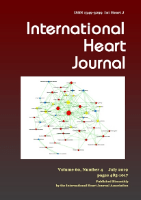
International Heart Journal
Fostering Collaboration in Cardiology ExcellenceInternational Heart Journal, published by INT HEART JOURNAL ASSOC, serves as a pivotal platform for research and discourse in the fields of cardiology and cardiovascular medicine. With its ISSN 1349-2365 and E-ISSN 1349-3299, this esteemed journal is based in Japan and is located at the University of Tokyo, Graduate School of Medicine, Department of Cardiovascular Medicine. Since its inception in 2005, International Heart Journal has blossomed into a respected publication with an impact factor that signifies its growing relevance, ranking in the Q3 category of both cardiology and miscellaneous medicine as of 2023. This journal not only disseminates vital research findings but also fosters collaboration among researchers and healthcare professionals. Notable for its Open Access options, it ensures the availability of its content to a broader audience, thereby enhancing knowledge transfer and innovation in cardiovascular care. With an ongoing commitment to improve clinical practice and patient outcomes, the journal continues to be an essential resource for those dedicated to advancing the understanding of heart health and disease.
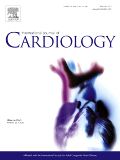
International Journal of Cardiology
Driving Impactful Research in Cardiovascular ScienceThe International Journal of Cardiology is a premier publication in the field of Cardiology and Cardiovascular Medicine, published by Elsevier Ireland Ltd. With an impressive impact factor and ranked in the top quartile (Q1) of its category, this journal serves as a vital resource for researchers, clinicians, and scholars committed to advancing cardiovascular health. Founded in 1981, the journal has been pivotal in disseminating significant findings, with a wide-ranging scope that includes original research, reviews, and clinical studies aimed at improving patient outcomes and understanding heart diseases. Its robust ranking of #73 out of 387 in Scopus ensures that it remains a leading platform for impactful cardiovascular research. While currently not an open-access publication, the journal's commitment to quality and relevance makes it an essential reference point within an ever-evolving medical landscape. For those engaged in cardiovascular research, the International Journal of Cardiology is not just a journal; it's an indispensable source of knowledge shaping the future of heart health.
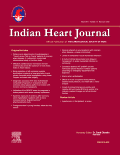
Indian Heart Journal
Championing Open Access to Cardiovascular InsightsIndian Heart Journal, published by Elsevier, is a distinguished peer-reviewed journal dedicated to the field of cardiology and cardiovascular medicine. Founded in 1961, this journal has been a pivotal resource for researchers, healthcare professionals, and students, providing a platform for innovative studies and insights into heart health. The journal transitioned to an Open Access model in 2013, ensuring widespread dissemination of vital research findings to enhance global understanding of cardiovascular diseases. Ranked in the Q3 category for Cardiology and Cardiovascular Medicine in 2023, it holds a reputable position in the medical community, with a Scopus rank of #222 out of 387 journals in the same field, placing it in the 42nd percentile. The Indian Heart Journal strives to foster advances in clinical practice and research while addressing the unique cardiac health challenges faced in India and beyond.

Minerva Cardiology and Angiology
Advancing cardiovascular knowledge for a healthier tomorrow.Minerva Cardiology and Angiology, published by EDIZIONI MINERVA MEDICA, is a prominent journal in the field of cardiology and cardiovascular medicine, with an ISSN of 2724-5683 and E-ISSN of 2724-5772. Established in 2021, this journal aims to foster the dissemination of cutting-edge research, clinical practice guidelines, and innovative methodologies relevant to cardiovascular health. As of 2023, it holds a commendable Q3 quartile rank in its category, reflecting its growing influence within the scientific community. The journal is indexed in Scopus, where it ranks #221 out of 387 in its field, placing it in the 43rd percentile overall. Although it currently does not offer Open Access options, articles published in Minerva Cardiology and Angiology contribute significantly to ongoing discussions and advancements in heart and vascular health. The journal serves as an invaluable resource for researchers, healthcare professionals, and students seeking to stay informed on the latest developments in cardiology.
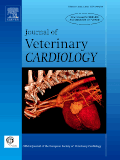
Journal of Veterinary Cardiology
Pioneering Insights in Veterinary CardiologyJournal of Veterinary Cardiology is a leading scientific publication dedicated to the field of veterinary cardiology, published by ELSEVIER. With an ISSN of 1760-2734 and E-ISSN 1875-0834, this journal plays a crucial role in disseminating cutting-edge research and clinical insights into animal cardiovascular health. With a strong emphasis on the interrelations of veterinary science and physiology, it boasts an impressive ranking in the Q1 category for miscellaneous veterinary studies and a significant position at 69th percentile in general veterinary rankings according to Scopus. Researchers, professionals, and students are encouraged to engage with the journal's diverse array of articles that span basic research to clinical applications, bridging knowledge gaps in veterinary cardiology. This important resource showcases impactful studies from its inception in 1999 and remains a steadfast conduit for the advancement of knowledge in the field through 2024 and beyond.

CANADIAN JOURNAL OF CARDIOLOGY
Empowering Cardiovascular Innovations Through Rigorous ResearchCanadian Journal of Cardiology (ISSN: 0828-282X, E-ISSN: 1916-7075), published by Elsevier Science Inc, serves as a vital platform for disseminating high-quality research in the dynamic field of cardiology and cardiovascular medicine. Since its inception in 1985, this journal has established itself as a leader in the field, currently holding a prestigious Q1 ranking in Cardiology, indicating its significant impact and contribution to medical science. With a Scopus rank of #50 out of 387 in its category and placing in the 87th percentile, the journal showcases rigorous peer-reviewed articles that advance knowledge and practice in cardiology. Although the journal is not open access, it provides valuable insights and research findings that cater to clinicians, researchers, and students who are committed to improving cardiovascular health. As we approach the convergence of years to 2024, the Canadian Journal of Cardiology continues to strive for excellence, facilitating a discourse vital for both academic and clinical advancements in cardiology.